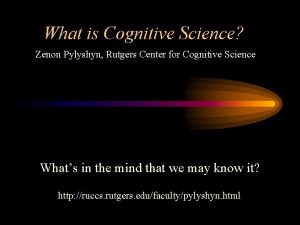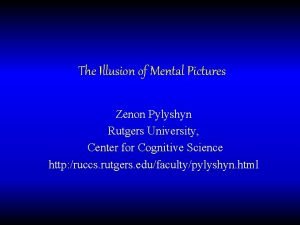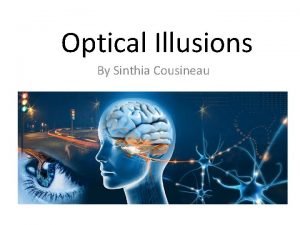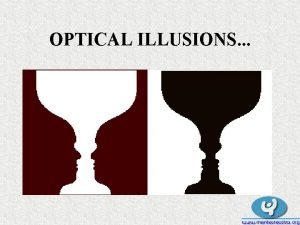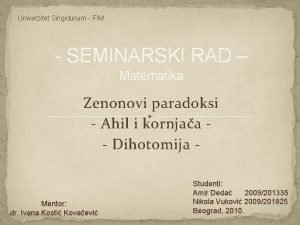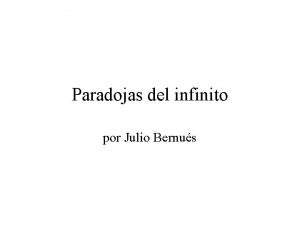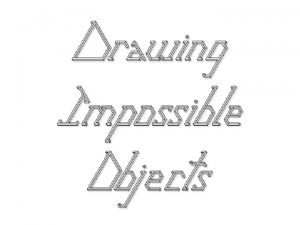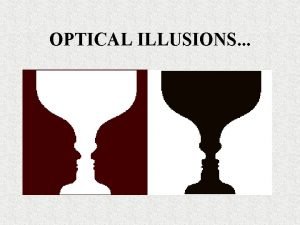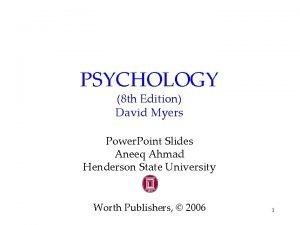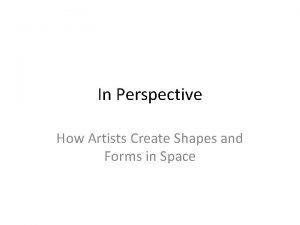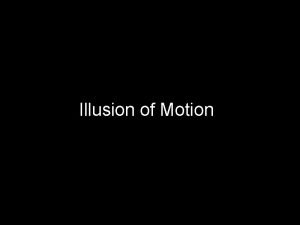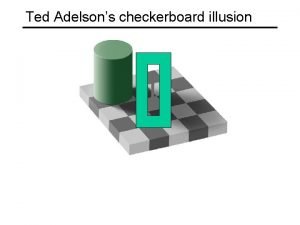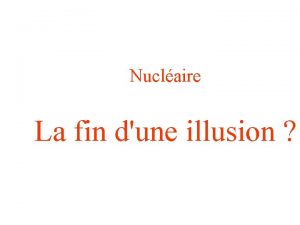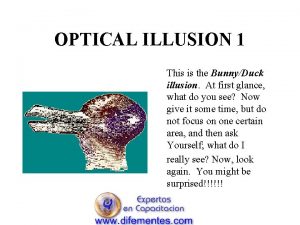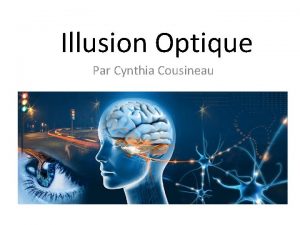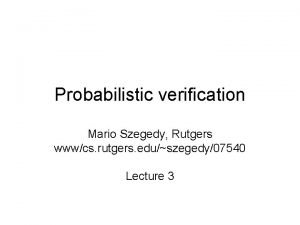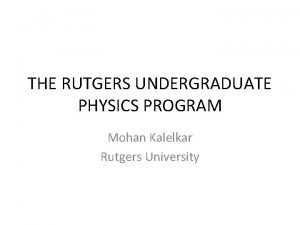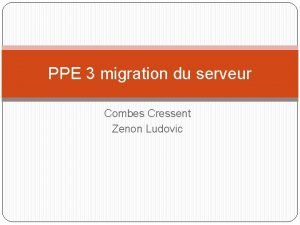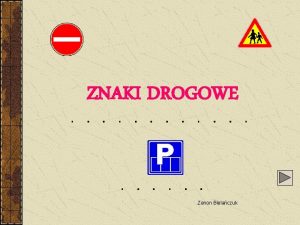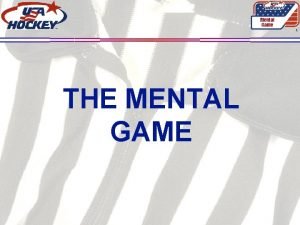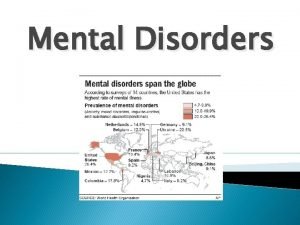The Illusion of Mental Pictures Zenon Pylyshyn Rutgers





































































- Slides: 69

The Illusion of Mental Pictures Zenon Pylyshyn Rutgers University, Center for Cognitive Science http: //ruccs. rutgers. edu/faculty/pylyshyn. html

The illusion of mental pictures ● There is no question that people (except maybe ~2% of the population) experience mental images when they recall, plan, anticipate and otherwise enjoy life in the absence of the things and people that they imagine ● Not only are we able to “picture” some object or scene in our “mind’s eye” but it seems that we must do so in order to solve certain kinds of problems ● Books are full of examples of how images helped people to discover and create theories and works of art – creations that would not have happened without the capacity to use mental imagery. I will not rehearse all the examples, but they include Einstein, Kikule, …

The illusion about the causal role of mental pictures in thought ● What happens when we create and inspect mental images? This is a deep problem because it touches on the mind-body duality and other potentially unsolvable problems. But it is important that as scientists we consider what is entailed by talk of creating, recalling, examining and transforming mental images. ● I have argued, and still believe, that there is a powerful illusion behind not only our folk understanding of mental imagery, but also behind our attempts to build scientific theories of it. ● The illusion is this: When we engage in what we call visualizing there is, somewhere (presumably in our head), a thing that we view more or less the way we view the world; a thing that we might as well call a mental picture since a picture is, after all, something that looks like thing that is pictured.

Some common mistakes in thinking about mental imagery 1. The intentional fallacy: Confusing properties of the imagined world with properties of the imagination or the mechanism or medium of imagery Examples : size, distance, and especially temporal duration 2. Task demands. Insufficient attention is paid to how subjects interpret instructions in imagery experiments. “Imagine x” “Pretend that you are seeing x happening” This is a “task demand” and is not a case of subjects being acquiescent and trying to give the result they think the experimenter wants. This is a rational and appropriate understanding of the task to imagine something. The consequence is that subjects will make as many properties as they know of and as they are able to control come out as it would have in reality.

Two mistakes in imagery research ● The intentional fallacy – confounding properties of the representation with properties of the represented ● Task demands – neglecting the fact that subjects are being asked to pretend that they are seeing something

1. A common mistake in thinking about mental imagery is called the “intentional fallacy” Confusing properties of the imagined world with properties of the imagination or the mechanism or medium of the image An image of X with property P can mean It’s the image that has the property! 1. (An image of X) with property P or 2. An image of (X with property P) It’s the X that has the property!

2. Demands of the task to “imagine x” Most of the behavioral research into dynamic properties of mental imagery is explained by noticing how one studies properties of imagined processes. When we ask subjects to “imagine that X” where X is some process (like looking at a small mouse or watching a spot move across a map from one place to another), what we are inviting the subject to do is pretend that they are seeing X happening. In that case, how X unfolds is dictated by what observers believe would happen if they were seeing it. This belief is often tacit and unconscious. ● This is not a case of subjects being disingenuous, or of acquiescing to “experimenter demand”. Rather it’s the rational response to the task as presented. ● After a few examples I will turn to the real question: Do people represent space when they imagine spatial layouts, and if so what does that entail, and how do they do it? ●

Examples to probe your intuition and your tacit knowledge Imagine various events unfolding before your “mind’s eye”… ● ● ● Imagine turning a heavy wheel. Now a light wheel. Which is faster? Imagine a baseball being hit. What shape trajectory does it trace? It is coming towards you: Where would you run to catch it? You have considerable “tacit knowledge” of what to do in this case. Imagine a coin dropping and whirling on its edge as it eventually settles. Describe how it behaves. (“Euler’s Disk” problem solved in 2000) Imagine a heavy ball (a shot-put) and a light ball (a tennis ball) being dropped at the same time from a building (e. g. , the leaning tower of Pisa). Indicate when they hit the ground. Repeat at different heights. Imagine a clear glass containing a colored liquid. Tilt it 45º to the left (counter-clockwise). What is the orientation of the liquid?

What color do you see when two color filters overlap?

Where would the water go if you poured it over a full beaker of sugar? Is there conservation of volume in your image? If not, why not?

Aside: What can we conclude from the contents of conscious experience?

And now for something more serious Representation of Space in mental images This is the question I am most interested in and it is a major topic in imagery research

Spatial character of mental images ● Among the more impressive findings of research on mental imagery are ones that suggest that images have spatial properties (e. g. , mental rotation, mental scanning, mental size effects, psychophysical measures of the “mind’s eye”). ● Intuitively we feel that we can reason by imagining things laid out in space and then by examining the display we can often read off the solution. Yet there have been few attempts to say exactly what being “laid out in space” means, either formally or physically. ● One of the most explicit statements concerning the spatial properties of images has been a statement by Steve Kosslyn about what he calls the depictive nature of mental images.

Images as displayed in “functional space” A statement of the picture theory (Kosslyn, 1994) ● “A depictive representation is a type of picture, which specifies the locations and values of configurations of points in a space”. ● “The space in which the points appear need not be physical…, but can be like an array in a computer, which specifies spatial relations purely functionally. That is, the physical locations in the computer of each point in an array are not themselves arranged in an array; it is only by virtue of how this information is ‘read’ and processed that it comes to function as if it were arranged into an array (with some points being close, some far, some falling along a diagonal, etc). ” (p 5) § I will argue that it is important why the information is ‘read’ in one way rather than in another since that determines whether the account is explanatory or descriptive or merely circular.

The illusion of mental (picture) space ● There have been two options for accounting for the spatial properties of images: Assume a physical display in the brain, or 2. Assume a mechanism that simulates spatial properties but is not itself a literal space. This is referred to as functional space. 1. ● Neither of these options is consistent with empirical evidence: The cortical space assumption is not consistent with neural or behavioral evidence and the functional space assumption is either metaphorical or circular. § Because a functional space has no inherent constraints, and exhibits whatever properties we stipulate it to have, it is not explanatory. § Later I will suggest that spatial properties are not in the head but in the relation of thought to concurrently-perceived space.

What does being “spatial” entail? Images and space: some possible constraints 1. Are images spatial? Do they have spatial properties such as size, distance, and relations such as above, next-to, inbetween? Do the axioms of Euclidean geometry and measure theory hold of patterns displayed in them? e. g. , a) ab + bc ac and ab = ba b) If abc = 90°, then ab 2 + bc 2 = ac 2 a b c 2. If such axioms are true of images, what would that entail about how they must be instantiated in the brain? a) Could they be analogue? What constraints does that impose? b) Is the space 2 -D or 3 D? 3. Is there a coherent notion of a “functional space, ” as something with the formal properties of space yet without being instantiated in real physical brain-space?

The spatial-metrical character of images ● The claim that images have spatial properties comes from our phenomenology, and also from a number of experiments suggesting that images must actually have metrical properties, particularly spatial ones (not just represent metrical properties, but have them). ● The most commonly cited experiments are ones that seem to involve continuous spatial properties § Image size § Mental rotation of images § Mental scanning across an image

Do images have “size”? ● There are many studies showing that when subjects imagine something small it takes them longer to detect small features (e. g. the mouse’s whiskers) than when they imagine them as large. What do these tell us about what “size” is? ● There are two possibilities: The size is either the size of the image or it is the size of the thing imagined. The first needs either a physical size or some theoretical idea about what constitutes image size that has yet to be provided, and the second can yield the observed result simply because the subject knows what would happen in the a viewing, namely if something is seen to be small the details will not be as clear or you will need to come closer (or ‘zoom’ in on the object) to see the details, so an observer will surely ensure that this happens. (What if it didn’t? ) ● Suppose, instead, you were asked how long it took to report details in a large blurred low-resolution image versus a small high definition image? Why is such a control not done?

Do mental images have (as opposed to represent) size? 1. Imagine a mouse across the room so it’s image “occupies a small part of your total image display”. 2. Now imagine it close to you so it fills your image display Ø Of these two conditions, in which do you see small details most clearly? In which does it take longer to “see the mouse’s whiskers? ” Ø What does this result tell you about the “size” of a mental image? 3. Imagine a horse. How close can you imagine coming to the horse before it starts to overflow your image? Repeat with a toaster, a table, a person’s face, etc. Does this provide a measure of “the visual angle of the mind’s eye” and a measure of the “mental size” of the horse? Ø Do these concepts have any meaning without the literal space view of images? Ø 4. Clearly these results are the ones you would expect if the subject is telling you what it would be like to see a real horse, mouse, etc

One of the least controversial examples of image transformation: Mental rotation Time to judge whether (a)-(b) or (b)-(c) are the same except for orientation increases linearly with the angle between them (Shepard & Metzler, 1971)

Imagine this shape rotating slowly Is this how it looked to you? When you make it rotate in your mind, does it seem to retain its rigid 3 D shape without re-computing it?

The missing ‘obligatory’ constraint ● What is assumed about the format or architecture of the mental representation in the examples of mental rotation? ● According to philosopher Jesse Prinz (2002) p 118, “If visual-image rotation uses a spatial medium of the kind Kosslyn envisions, then images must traverse intermediate positions when they rotate from one position to another. The propositional [i. e. , symbolic] system can be designed to represent intermediate positions during rotation, but that is not obligatory. ” ● This is a very important observation to which I will return. But the statement is incomplete. It needs to answer the question: What makes it obligatory that the object must ‘pass through intermediate positions’ when rotating in ‘functional space’, and what constitutes an ‘intermediate position’? These terms apply to the represented world, not to the representation!

The important distinction between architecture and represented content? ● It is only obligatory that a certain pattern must occur if the pattern is caused by fixed properties of the architecture as opposed to being due to properties of what is represented (i. e. , what the observer tacitly knows about the behavior of what is represented) § If it is obligatory only because theorist says it is, then score that as a free empirical parameter § The important consequence is that if we allow one theory to stipulate what is obligatory without there being a principle that mandates it, then any other theory can stipulate the same thing. So theories are unconstrained and explain nothing. § This failure of image theories is quite general – all picture theories suffer from the same lack of principled constraints

How are these ‘obligatory’ constraints realized? ● Image properties, such as size and rigidity are assumed to be inherent in the architecture (of the ‘display’) ● That raises the question of what kind of architecture could possibly enforce rigidity of shape? § Notice that there is nothing about a spatial display, let alone a functional space, that makes it obligatory that shape be rigidly maintained as orientation is changed. § Also such rigidity could not be part of the architecture of an imagery module because we can easily imagine situations in which rigidity does not hold (e. g. imagine a rotating snake!). § There is also evidence that ‘mental rotation’ is incremental, not holistic, and the speed of rotation depends on the conceptual complexity of the shape and the comparison task.

Mental rotation – the real story In mental rotation the phenomenology motivates theory of “rotation” – but what the data show is that, § Mental rotation is only found when the comparisons are enantiomorphs (3 D mirror-images) § No rotation occurs if the figures have landmarks that can be used to identify the relations among their parts or if differences are specifiable in allocentric coordinates § Records of eye movements show that mental rotation is done incrementally: It is not a holistic rotation as often reported. If fact even the phenomenology is not of a smooth continuous rotation (your experience just now) § The “rate of rotation” depends on the conceptual complexity of the figure and also of the recognition task so that, at least, is not a result of the architecture (Pylyshyn, 1979). There are even demonstrations that it depends on how the subject interprets the figure (Kosslyn, xx).

“Rate of mental rotation” depends on task complexity ‘Good’ subset ‘Bad’ subset Not a subset

Example 2: Mental Scanning ● Some hundreds of experiments have now been done demonstrating that it takes longer to scan attention between places that are further apart in the imagined scene. In fact the time-distance relation is linear. ● These have been reviewed and described in: § Denis, M. , & Kosslyn, S. M. (1999). Scanning visual mental A window on theonmind images: A window the!! mind. Cahiers de Psychologie Cognitive / Current Psychology of Cognition, 18(4), 409 -465. § Rarely cited are experiments by Liam Bannon and me (described in Pylyshyn, 1981) which I will summarize for you.

Studies of mental scanning Does it show that images have metrical space? (Pylyshyn & Bannon. Described in Pylyshyn, 1981) Conclusion: The image scanning effect is Cognitively Penetrable Ø i. e. , it depends on goals and beliefs, or on Tacit Knowledge.

The central problem with imagistic explanations… What is assumed in the mental picture explanations of mental scanning? ● In actual vision, it takes longer to scan a greater distance because real distance, real motion, and real time is involved, therefore this equation holds due to natural law: Time = distance speed But what ensures that a corresponding relation holds in an image? The obvious answer is: Because the image is laid out in real space! · But what if that option is closed for empirical reasons? Well you might appeal to a “Functional Space” which imagists liken to a matrix data structure in which some pairs of cells are closer and others further away, and to move from one to another it is natural that you pass through intermediate cells ● Question: What makes these sorts of properties “natural” in a matrix data structure?

What warrants the ‘obligatory’ constraint? To use Prinz’s term, it is not obligatory that the wellknown relation between distance, speed and time hold in functional space or in a matrix. There is no natural law or principle that requires it. You could imagine an object moving instantly or according to any motion relation you like, and the functional space would then comply with that since it has no constraints of its own.

Where does the obligatory constraint come from? There at least two reasons why the following equation holds in the mental image scanning task, even though, unlike in the real vision case, it does not follow from a natural law. Time = Representation of distance Representation of speed By the way, there are reasons to question even this widely-held view! Because subjects have tacit knowledge that this is what would happen if they viewed a real display, and they understand the task to be one of reproducing properties of this viewing, or 2. Because the matrix is taken to be a simulation of real space. In that case the reason that the equation holds is that it is supposed to be simulating real space and the equation holds in real space. 1. Ø In that case it is not something about the form of the representation that provides the principled constraint, it’s the fact that it is supposed to be simulating real space which is where the obligation comes from. But the same thing can be done for any form of representation.

Real and functional space ● ● ● What is assumed by ‘picture’ accounts of mental imagery experiments, including those involving image scanning, image size and image rotation, is that images have the properties of a real spatial display as viewed by the mind’s eye; this is what provides a principled explanation. But as we will see, this explanation carries a number of assumptions, including that images are 2 D patterns laid out in real space (presumably on visual cortex). Because the evidence does not support this assumption*, imagists appeal to a “functional” space. What is a functional space and how does it explain the scanning or image size findings?

What is “functional space”? ● Because functional space is cited by almost every imagery theorist, it deserves some attention. ● The main point about a functional space is that it has whatever properties we want to assign it – i. e. , it can be made to fit any data. We stipulate that it takes longer to scan greater distances since the law relating distance, time and speed does not apply to a functional space. § For that reason a functional space does not differ from any other proposal about how space is represented; the properties we assign to functional space can be assigned to any other theory. So the concept of functional space does no explanatory work. ● The assumption that functional space must have certain obligatory (as Prinz put it) spatial properties, relies on one of several mistakes which result in these properties seeming more “natural” in a functional space.

Why is it ‘natural’ to assume that functional space is like real space? There are several possible reasons why a functional space, such as a matrix data structure, appears to have natural spatial properties (e. g. , distances, size, empty places): 1. Because when we think of incarnations of functional space, such as a matrix, we think of how we picture them on paper. § In fact a matrix does not intrinsically have distance, empty places, direction or any other such property, except in the mind of the person who draws it or uses it! § Moving from one cell to another does not require passing through intermediate cells unless we stipulate that it does. The same goes for the very concept of ‘intermediate cell’.

Why is it ‘natural’ to assume that functional space is like real space? 2. Because when we think of a functional space, such as a matrix, we think of it as being a way of simulating real space inside the model – making it more convenient to build the model which otherwise would require special hardware § This is why we think of some cells as being ‘between’ others and some being farther away, etc. This makes properties like distances seem natural because we interpret the matrix as simulating real space. § In that case we are not appealing to a functional space in explaining the scanning effect, the size effect, etc. The explanatory force of the explanation comes from the real space that we are assuming. t This is just another way of assuming a real space (in the brain) where representations of objects are located in neural space t All the reasons why the assumption of real brain space cannot be sustained in explanations of mental imagery phenomena apply to this version of ‘functional space. ’

Functional space and explanatory power ● There is a notion of explanatory power that needs to be kept in mind. It is best illustrated in terms of models that contain empirical parameters, as in fitting a polynomial curve to data. ● The general fact about fitting a model to data is that the fewer parameters that need to be estimated from the data to be fitted, the more powerful the explanation. Thus the lower the order of the polynomial fit the better the explanation. ● In terms of the current example of explaining results of experiments involving mental imagery, appealing to a “functional space” leaves open an indeterminate number of empirical parameters, so it provides a very weak (or vacuous) explanation. ● A literal (brain) space, on the other hand, is highly constrained since it must conform to Euclidean axioms and Newtonian physics – otherwise it would not be the space of natural science. But that kind of space implies that images are displayed on a surface in the brain.

What next? ● So we turn now to the only place where we might be able to find properties that explain the experimental imagery results – the brain – because it is the only place where there is literal physical space that could function to underwrite such operations as scanning or rotation. No wonder the more recent work on imagery has been carried out in collaboration with neuroscience.

The good news I. Is there any reason to be optimistic about finding mechanisms of imagery in visual cortex* ● There is neuroanatomical evidence for a retinotopic layout in the earliest visual area of the brain (V 1) ● Neural imaging data shows that V 1 is more active during mental imagery than during other forms of thought ● Transcranial magnetic stimulation (TMS) of visual areas interferes more with imagery than other forms of thought ● Clinical cases of visual agnosia show that some impairments of vision have associated impairments of imagery (Bisiach, Farah) ● Recent psychophysical observations of imagery show parallels with corresponding observations of vision, and these can be related to the receptive cells in V 1 (e. g. , oblique effect)

Neuroscience evidence shows that the retinal pattern of activation is displayed on the surface of the cortex There is a topographical projection of retinal activity on the visual cortex of the cat and monkey. Tootell, R. B. , Silverman, M. S. , Switkes, E. , & de Valois, R. L (1982). Deoxyglucose analysis of retinotopic organization in primate striate cortex. Science, 218, 902 -904.

The bad news II. There are problems with drawing conclusions about mental imagery from such neuroscience data 1. The capacity for imagery and for vision are independent. Also all imagery results are observed in the blind as well as in patients with no visual cortex. 2. Cortical topography is 2 -D, but mental images are 3 -D – all phenomena (e. g. rotation) occur in depth as well as in the plane. 3. Patterns in the visual cortex are in retinal coordinates whereas images are primarily in world-coordinates Ø Unless you make a special effort, your image of parts of the room stays fixed in the room when you move your eyes or turn your head or walk around the room

III There are problems with drawing conclusions about mental imagery from such neuroscience data 4. Accessing and manipulating information in an image is very different from accessing it from the perceived world. Order of access from images is highly constrained. Ø Some have tried to explain this by postulating rapid decay of images, but the times involved in these demonstrations are not consistent with the data (e. g. , times for reporting letters are comparable to those involving size or scanning). Ø Conceptual rather than graphical properties are relevant to image complexity (e. g. , mental rotation) so image representations seem to be conceptual Ø If images consist in patterns on visual cortex then they behave differently when the same patterns are acquired from vision. For example the important Emmert’s law applies to retinal and cortical images but not to mental images, a fact largely unnoticed.

There are problems with drawing conclusions about mental imagery from these neuroscience data 5. The signature properties of vision (e. g. , spontaneous 3 D interpretation, automatic reversals, apparent motion, motion aftereffects, and many other phenomena) are absent in images; 6. A cortical display account of most imagery findings is incompatible with the cognitive penetrability of mental imagery phenomena, such as scanning and image size effects; 7. The fact that the Mind’s Eye is so much like a real eye (e. g. , oblique effect, resolution fall-off) should serve to warn us that we may be studying what observers know about how the world looks to them, rather than what form their images take (unless the Mind’s eye is exactly the same as the real eye!).

But there are problems with drawing conclusions about mental imagery from neuroscience data 9. Many clinical cases cited by image theorists can be explained by appeal to tacit knowledge and attention Ø The ‘tunnel effect’ found in vision and imagery (Farah) is Ø likely due to the patient knowing how things looked to her post-surgery Hemispatial neglect seems to be an attention deficit, which explains the neglect in imagery reported by Bisiach. A recent study shows that image neglect does not appear if patients have their eyes closed (Bartolomeo & Chokron, 2002). This fits well with the account I have offered in which the spatial character of mental images derives from concurrently perceived space.

A few examples illustrating the type of problems that neuroscience accounts run into in explaining behavioral findings with imagery l l In a footnote in Kosslyn, Thompson & Ganis (2007) the authors cite Ned Block as claiming that one does not need an actual 2 D cortical display, so long as the connections upstream from the cortex can decode any pair of neurons in terms of their distance in V 1, so arguments against literal spatial display are not relevant. Think of long stretchy axons connecting points on a 2 D surface (retina or visual cortex) to subsequent processes. Now imagine that the V 1 neurons are randomly moved around so they no longer constitute a 2 D layout. As long as the upstream connections remain fixed it will still behave as though there was a 2 D surface. Ø Call this the “encrypted 2 D layout” version of literal space

Encrypted 2 D space example Imagine this is the way it was initially Imagine this is the way it is after scrambling The Associative cortex will still function the same way even when the layout on V 1 is not isomorphic to the mental image

1. The encrypted-spatial layout alternative (con’t) ● By itself the encrypted-layout alternative will not do because without referring to the original locations, the relation between pairs of neurons and scan time is not principled. In the end the only principle we have is Time=distance/speed so unless the upstream system actually decrypts the neuronal fibers into their original 2 D surface locations, the explanation for the increased time with increased imagined distance remains a mere stipulation – it is not obligatory. It stipulates, but does not explain why, when two points are further away in the imagined layout it takes longer to scan between them or why scanning between them requires that one visit ‘intermediate’ locations along the way because in the encrypted layout there are no distances nor any intermediate locations. ● Once again so long as what we have is just a stipulation, as opposed to a general principle, we can apply it to any form of representation!

2. Image size and the visual cortex ● There is evidence that when imagining “large” objects that overflow one’s phenomenal image a different pattern of activation in visual cortex occurs than when imagining a small object. § This in itself is not remarkable since all scientists accept that a difference in mental experience must be accompanied by some difference in the neural state – this is called materialism, or more technically supervenience. ● The activation pattern when imagining a large visual pattern is claimed to be similar to the activation pattern when perceiving a large visual pattern (large on the retina). In vision, objects that extend into the parafovia of the eye, project onto the more frontal parts of the visual cortex. Imagists claim that this is also true when imagining a large pattern that fills the mental screen.

2 a. Image size…. Continued l The mere fact that larger images lead to activation in different (rather than larger) regions of the cortex does not in itself help to explain the size effect. § The explanation of why larger images are associated with shorter reaction times, is that for a given display resolution, more details can be displayed when the image is larger (and a neural account for this assumption is given in terms of lateral inhibition among neurons in V 1). The actual size (as well as the resolution) of the image display always enters into explanations of the size effect.

3. The oblique effect ● In vision, when a set of lines is to be discriminated (distinguished from a single blur) the discrimination is easier when the lines are vertical or horizontal than when they are at a 45° angle. This is called the Oblique Effect. It is a low-level effect that occurs in early vision. ● Does the Oblique effect occur with mental images?

Do images have low-level visual properties? ● Imagine a grating in which the bars are: 1. Horizontal 2. Vertical 3. Oblique (45°) ● Imagine the bars getting closer and closer together. In which of these displays do the bars blur together first? § In vision, the oblique bars blur earlier (called oblique effect) § In imagery, a similar result was found ● Kosslyn, Thompson & Ganis (2006) argued that this is because there are more vertical- and horizontal-tuned cells than oblique-tuned cells in visual cortex. So this confirms that images are projected onto visual cortex.

Neurological explanations for both cases? ● An accepted explanation of the psychophysical case (where lines were viewed) is that there are more horizontal and verticalsensitive the visual cortex than oblique-sensitive cells in V 1. Can the same explanation work for the imagined bars? Kosslyn et al claim that it does and that this provides additional support for the view that images are laid out in visual cortex. ● But this argument rests on a misunderstanding of how the orientation-specific cells get their orientation property: they get it from the way they are wired to photoreceptive cells on the retina. Vertical cells are more often wired to columns of cells while horizontal cells are more often wired to rows of photocells. ● If patterns of bars were activated on the surface of cortex by mental imagery then horizontal cells would be no more likely to be activated by horizontal patterns than by vertical patterns. The only way that images of horizontal bars would preferentially activate horizontal cells is if the images were on the retina!

What happens when horizontal/vertical cells are activated by means other than retinal patterns? 9 vertical 9 horizontal 5 oblique The proportion of Vertical, Horizontal & Oblique cells remains the same in all cases – they are random samples!

An overarching consideration: What if colored three-dimensional images were found in visual cortex? What would that tell you about the role of mental images in reasoning? Would this require a homunculus?

Should we welcome back the homunculus? ● In the limit if the visual cortex mapped the contents of one’s conscious experience involving mental imagery we would need an interpreter to “see” this display in visual cortex ● But we will never have to face this prospect because experiments show that the contents of mental images (other than in iconic memory that lasts for a fraction of a second) are already conceptual (or, as Kosslyn puts it, are ‘predigested’) and therefore unlike any picture. ● Finally, you can make your image do whatever you want, and to have whatever properties you wish. There are no known constraints on mental images that cannot be attributed to lack of knowledge of the imagined situation (e. g. , imagining a 4 -dimensional object).

Are there any ways of representing spatial layouts that are not excluded by this analysis? ● Maybe we have been looking in the wrong place for things that fall under the formal requirements of being spatial. Maybe they are not in the head after all. ● I have sketched a way of looking at this problem that locates the spatial character of thought in the concurrently-perceived world (see Chapter 5 of my 2007 book, Things and Places). I will end with just a hint of this approach. It relies on findings from the study of the interaction among perceptual modalities and imagery as well as with motor actions and also neuroscience findings concerned with coordinate transformation mechanisms in the brain.

Another chapter in the imagery debate: The interaction of images with vision and motor control ● One of the more interesting lines of research on the spatial character of mental images involves studies of the interaction of images with perceived spatial layouts and with the motor system ● From the beginning it has been clear to me that one of the properties of mental images that makes them appear spatial is that they connect in certain ways not only with vision, but also with the motor system: § We can point to things in our image! ● We can “project” our images onto perceived space – even space perceived in different modalities. I believe that this observation is the key to understanding the alleged spatial character of images. ● This does not require that a picture be projected, only the locations of a small number of features. As it happens, in my day job I have studied a mechanism I call a FINST that is well suited for this task.

Projecting images: Shepard & Podgorny experiment Both when the displays are seen and when the F is imagined, RT to detect whether the dot was on the F is fastest when the dot is at the vertex of the F, then when on an arm of the F, then when far away from the F – and slowest when one square off the F.

Both vision and visual imagery have some connection to the motor system ● Imagery clearly has some connection to motor control § You can point to things in your image. Important § This may be why images feel spatial idea! ● You can get Stimulus-Response compatibility effects between the location of a stimulus in an image and the location of the response button in space ● Ronald Finke showed that you could get adaptation with imagined hand position that was similar to adaptation to displacing prism goggles ● Both these findings provide support for the view that the spatial character of images comes from something being projected onto a concurrently perceived scene. § This is the main new idea in Chapter 5 of Things & Places)

S-R Compatibility effect with a visual display: The Simon effect: It is faster to make a response in the direction of an attended objects than in another direction Response for A is faster when YES in on the left in these displays

S-R Compatibility effect with a recalled (imagined) display The same RT pattern occurs for a recalled display as for a perceived one RT is faster when the A is recalled (imagined) as being on the left

What about mental scanning?

Using a concurrently perceived room to anchor FINSTs tagged with map labels

Studies of mental scanning Does it show that images have metrical space? The image scanning effect was shown to be Cognitively Penetrable. But what allows a smooth scan across the image is the perceptual display. Without the perceived map scanning would not be smooth and continuous and the timing would not be accurate (Pylyshyn & Cohen, 1999).

Where do we stand? ● It seems that a literal picture-in-the-brain theory is untenable for many reasons – including the major empirical differences between mental images and cortical images. A serious problem with any formatbased explanation of mental imagery is the cognitive penetrability of many of the imagery demonstrations. ● So the pictorial quality of images is an illusion that arises from the similarity of the experience of imaging and of seeing So how do we explain the similarity of the experience of imagining and of seeing – the fact that they both seem to involve a pictorial panoramic display? It is very likely that neither experience correctly reveals the form of the representation.

This is what our conscious experience suggests goes on in vision…

This is what the demands of explanation suggests must be going on in vision…

l For a copy of these slides see: http: //ruccs. rutgers. edu/faculty/pylyshyn/Objects&Places 2009

You are now here X But you are also here

END
 Rutgers cognitive science
Rutgers cognitive science Zenon pylyshyn
Zenon pylyshyn How many faces
How many faces Hardest illusion
Hardest illusion Zenon de elea
Zenon de elea Ahil i kornjača
Ahil i kornjača Zenon quispe
Zenon quispe Zenon staking
Zenon staking Zénón z eleje
Zénón z eleje Zenon bankowski
Zenon bankowski Zenón z eleje
Zenón z eleje Parmenides arje
Parmenides arje Paradojas del infinito
Paradojas del infinito Zenon wasilewski
Zenon wasilewski Zenon czechowski
Zenon czechowski Mental health and mental illness chapter 20
Mental health and mental illness chapter 20 Stress management jeopardy
Stress management jeopardy Mental pictures meaning
Mental pictures meaning Universal pictures columbia pictures
Universal pictures columbia pictures Paramount columbia
Paramount columbia độ dài liên kết
độ dài liên kết Chó sói
Chó sói Thiếu nhi thế giới liên hoan
Thiếu nhi thế giới liên hoan điện thế nghỉ
điện thế nghỉ Một số thể thơ truyền thống
Một số thể thơ truyền thống Trời xanh đây là của chúng ta thể thơ
Trời xanh đây là của chúng ta thể thơ Thế nào là hệ số cao nhất
Thế nào là hệ số cao nhất Hệ hô hấp
Hệ hô hấp Lp html
Lp html Số nguyên tố là số gì
Số nguyên tố là số gì Fecboak
Fecboak đặc điểm cơ thể của người tối cổ
đặc điểm cơ thể của người tối cổ Các châu lục và đại dương trên thế giới
Các châu lục và đại dương trên thế giới Tư thế worms-breton
Tư thế worms-breton ưu thế lai là gì
ưu thế lai là gì Tư thế ngồi viết
Tư thế ngồi viết Cái miệng xinh xinh thế chỉ nói điều hay thôi
Cái miệng xinh xinh thế chỉ nói điều hay thôi Cách giải mật thư tọa độ
Cách giải mật thư tọa độ Các châu lục và đại dương trên thế giới
Các châu lục và đại dương trên thế giới Bổ thể
Bổ thể Tư thế ngồi viết
Tư thế ngồi viết Thẻ vin
Thẻ vin V cc
V cc Thể thơ truyền thống
Thể thơ truyền thống Chúa sống lại
Chúa sống lại Từ ngữ thể hiện lòng nhân hậu
Từ ngữ thể hiện lòng nhân hậu Hổ đẻ mỗi lứa mấy con
Hổ đẻ mỗi lứa mấy con Diễn thế sinh thái là
Diễn thế sinh thái là Vẽ hình chiếu vuông góc của vật thể sau
Vẽ hình chiếu vuông góc của vật thể sau 101012 bằng
101012 bằng Tỉ lệ cơ thể trẻ em
Tỉ lệ cơ thể trẻ em Lời thề hippocrates
Lời thề hippocrates đại từ thay thế
đại từ thay thế Vẽ hình chiếu đứng bằng cạnh của vật thể
Vẽ hình chiếu đứng bằng cạnh của vật thể Quá trình desamine hóa có thể tạo ra
Quá trình desamine hóa có thể tạo ra Công thức tiính động năng
Công thức tiính động năng Các môn thể thao bắt đầu bằng tiếng chạy
Các môn thể thao bắt đầu bằng tiếng chạy Thế nào là mạng điện lắp đặt kiểu nổi
Thế nào là mạng điện lắp đặt kiểu nổi Hình ảnh bộ gõ cơ thể búng tay
Hình ảnh bộ gõ cơ thể búng tay Khi nào hổ mẹ dạy hổ con săn mồi
Khi nào hổ mẹ dạy hổ con săn mồi Các loại đột biến cấu trúc nhiễm sắc thể
Các loại đột biến cấu trúc nhiễm sắc thể Biện pháp chống mỏi cơ
Biện pháp chống mỏi cơ Gerhard roth willensfreiheit ist eine illusion plato schema
Gerhard roth willensfreiheit ist eine illusion plato schema Penrose triangle sculpture
Penrose triangle sculpture Hardest illusion
Hardest illusion Mark schaller
Mark schaller The illusion of taking charge examples
The illusion of taking charge examples The moses illusion
The moses illusion Interviewer illusion psychology definition
Interviewer illusion psychology definition A graphic system that creates the illusion of depth
A graphic system that creates the illusion of depth
